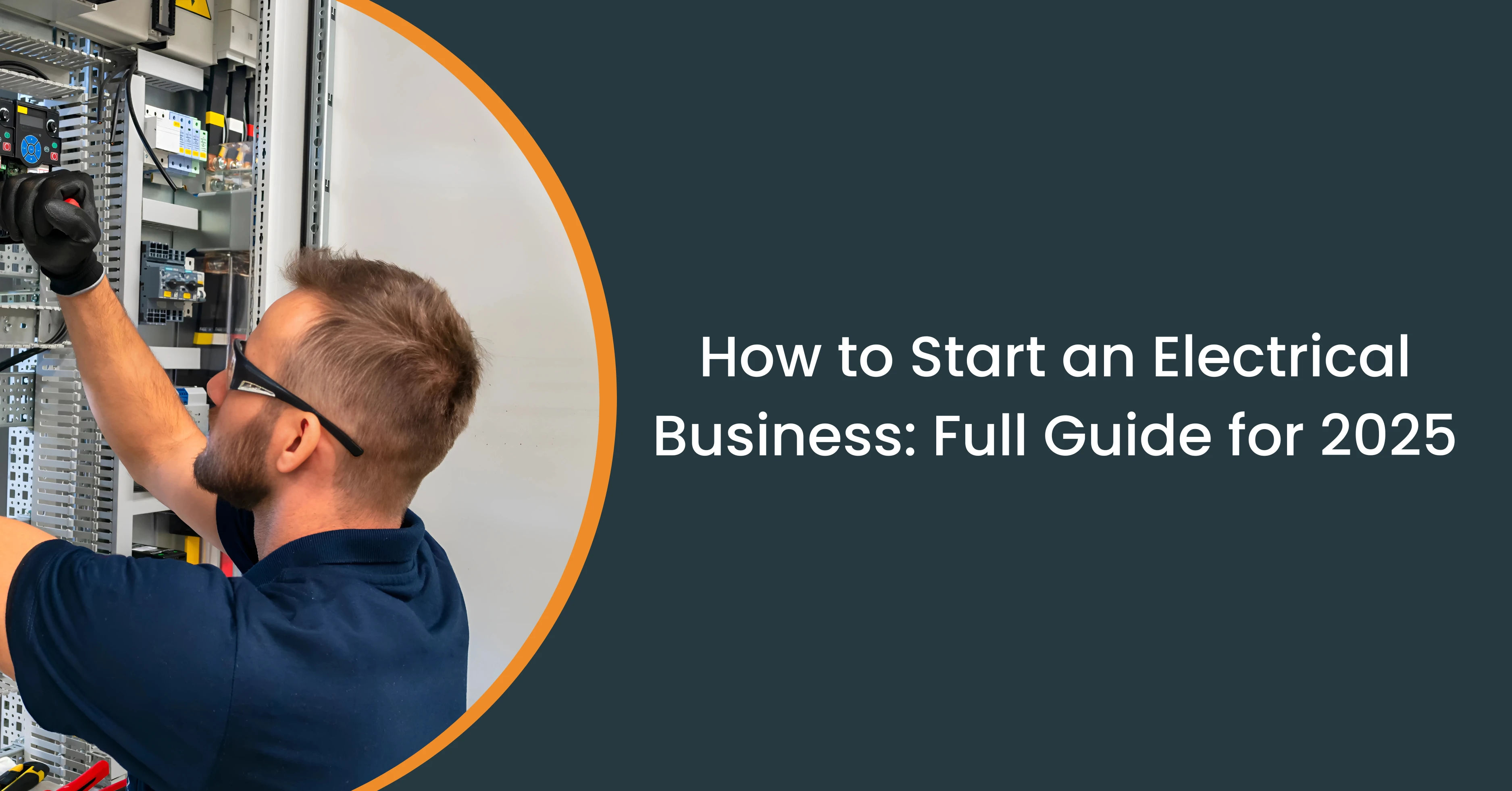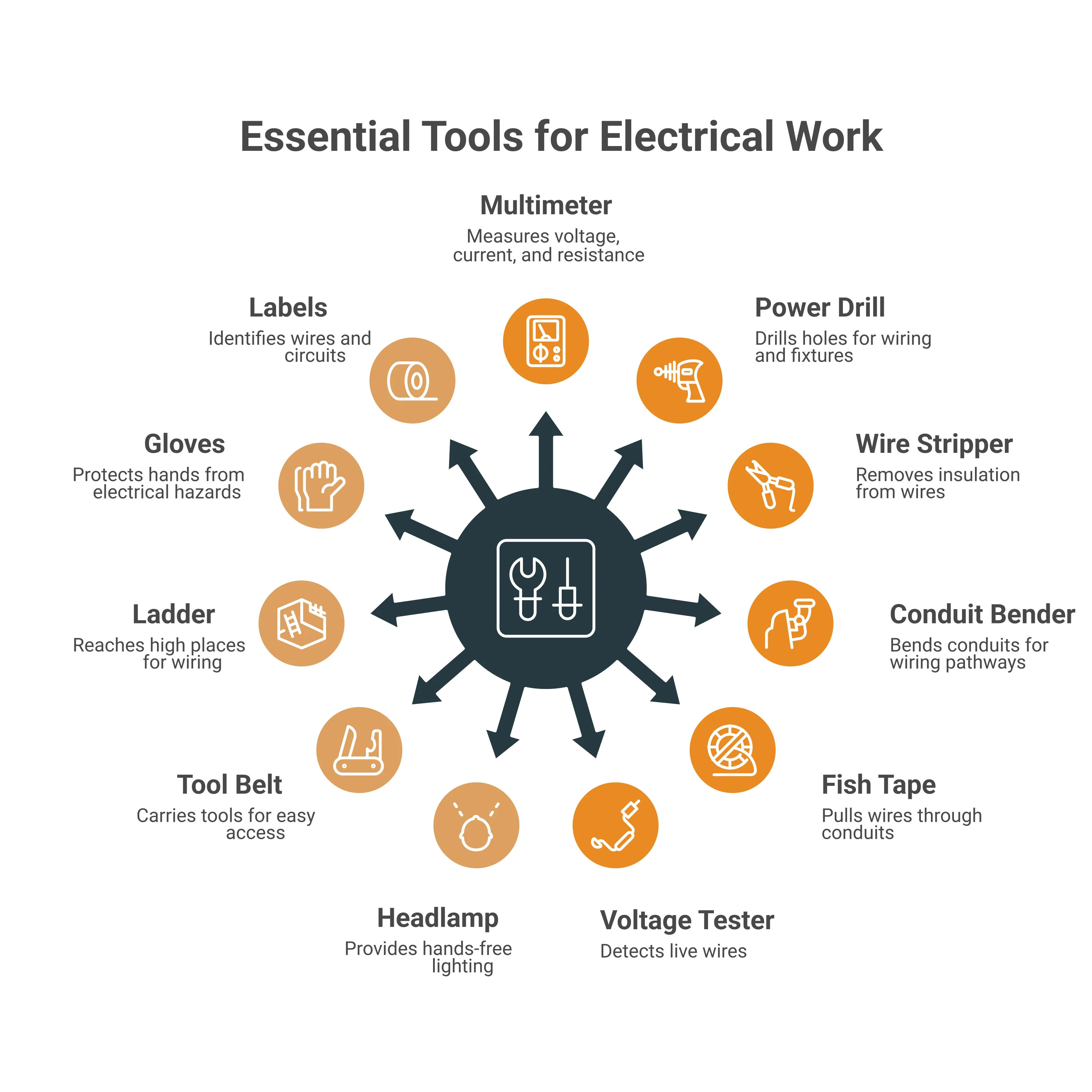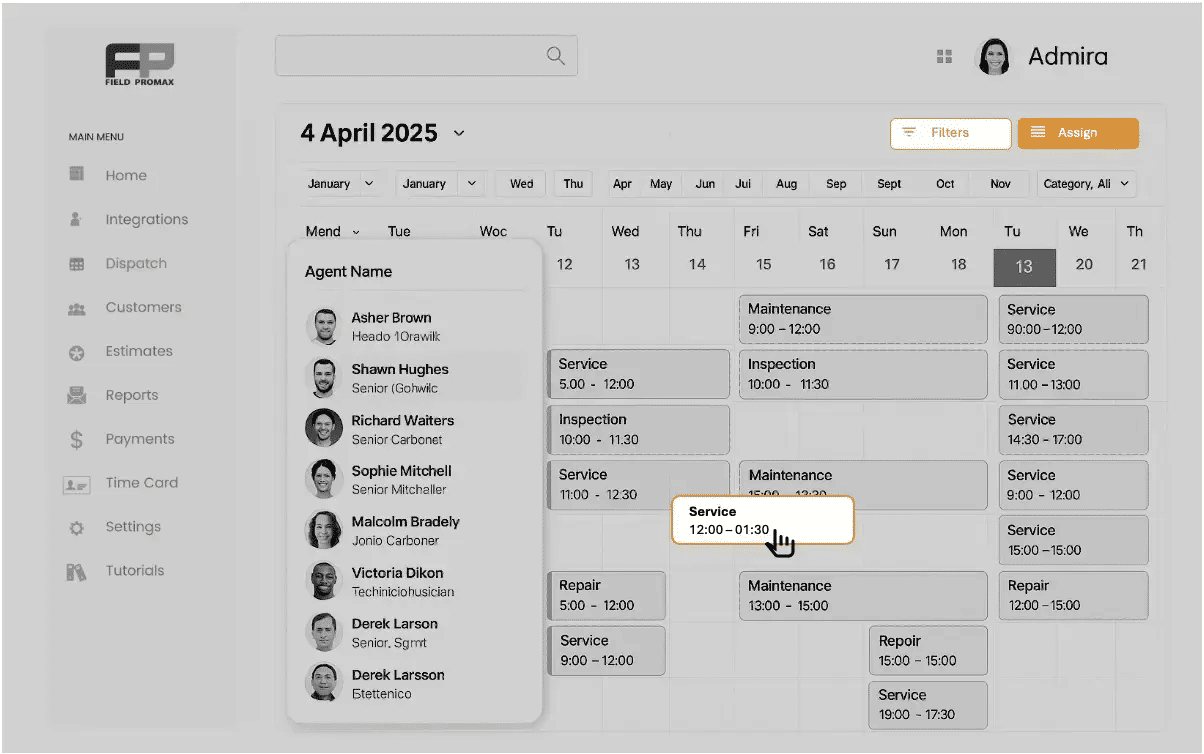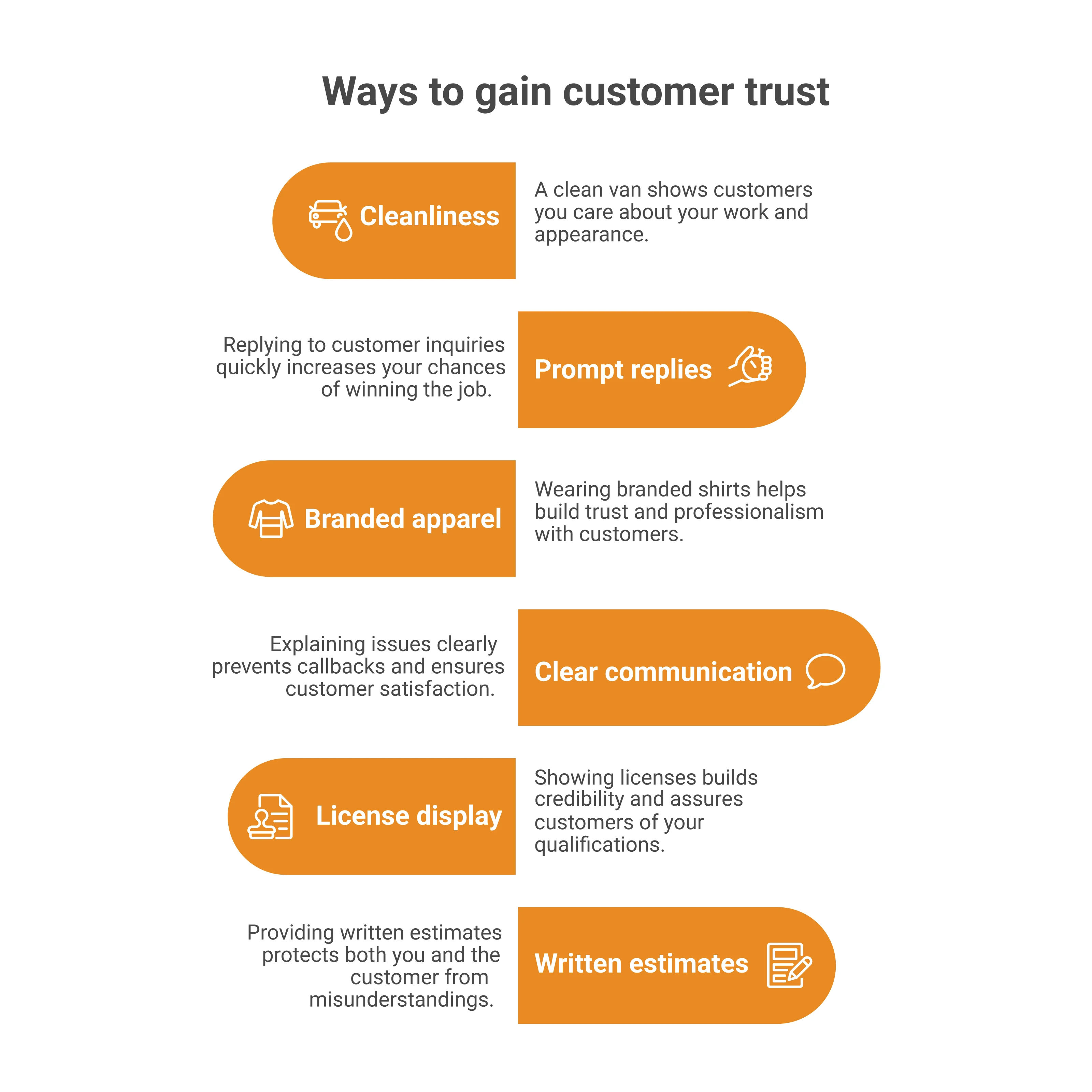How to start a successful electrical business in 2025: A comprehensive guide for new contractors?

Thinking of starting your own electrical business in 2025?
Well, the play is long, so be ready to live with wires without electrifying yourself.
Real talk: Electricians aren't going out of style anytime soon. In fact, the U.S. is expecting 84,300 more of them by 2033 - that’s an 11% job growth. So yeah, wires = wealth.
Plus, how can we miss talking about sustainability initiatives, solar panels and EV charging stations that are blowing up faster than your uncle’s DIY home wiring job.
Today, there are around 70000 electrical businesses in the US and trust me, they aren’t all shocking. If you want to stand out, you have to think smarter, work harder and probably resist the temptation to staple your business cards to people’s doors.
Want to learn how to start an electrical business that wins the market?
It’s time to get weirdly-successful.

Meet Licensing and Training Requirements
First things first- you cannot just grab a pair of pliers and yell “I’m an electrician!” and start collecting checks. Starting an electrical company means starting your own electrical business legally. Translation- You need a license, bro. Have proper electrician certification and no, YouTube tutorials don’t count here. You have to complete a journeyman apprenticeship and then get that master electrician status required by your region. Your state might like you as an electrician but other state might ask you for a different mandate. Understand numbers of hours you need to complete and the exams to pass for different states. Fulfil licensing exams because nothing beats fun of filling out government paperwork. Each state has a different set of challenge in way of exams ready for you. Check your state specific ones get the required electrical contractor license before operating. Keep up with safety codes to keep the clients shock free. The National Electrical Code update and safety standards should not be juggling words for you. Be learned! If you want to know how to start an electrical business without landing yourself on an episode of “World’s dumbest contractors”? Choose these- apprentice, examination and partnering with a licensed master electrician.
Pro tip- Keep Googling how to start an electrical business at 3 am. This is the madness you need to have that success.
Ready to get started with Field Promax?
Sign Up FreeDevelop a comprehensive business plan and define your services
Okay, now that you are legally allowed to hold a screwdriver, it’s time to talk business. Because starting an electrical company without a plan is like wiring a house without any blueprint. You just have to follow these to cover up your plans:
- Company overview- Mention who you are and why you’re awesome. Speak for you, because, who else will?
- Target market- Who is going to give you money and the jobs. Figure out your target people.
- Competitive analysis- Make notes on how you can be better than Larry the Lazy electrician.
- Operational plan- Will you work alone like a cool loner or want to have a big crew who can save your time sometime.
- Financial projections- The goal is to make money. Stick to it. Do charity later on.
Planning out how to start electrical business will also help you see how big you can grow as an individual, and am not talking about beard.
Secure financing and plan your startup costs
Spoiler alert: starting your own electrical business costs real human money. No one is coming to turn your pliers into a profitable empire. Here’s a detail version on what you’ll need cash for:
- Tools, ladders and a snazzy truck to load them
- Business formation fees, paperwork and legal costs
- Insurance in case your client’s cat gets electrocuted
- Office gear and electrical business software to stay insane
- Marketing budget to showcase your logo and brand presence. 2-5% of projected revenue is the smartest to spend on marketing.
Smart ones can fork out the above cost would come around $5000-$25000 initially. Now, comes the saving the situation thing- funding options:
- Bank loan- bring tissue, you’ll cry during the paperwork
- Grants- it’s a free money if you can find yourself one
- Partnerships- they are like marriages, might end up messy
Shocking financing options
Small business loans and line of credit: Banks and credit unions might lend you a few volts if you’ve got a solid business plan and a credit score that doesn’t trip the breaker. Oh, yes, the US Small Business Administration? They are like your financially savvy electrician uncle who might co-sign your entrepreneurial dreams. Just be ready for some paperworks.
1. Grants and Government program
Think of these as free lightning bolts. They are rare, often minority-owned and competitive. But if you qualify? You could be sitting on a government-funded power surge.
2. Investors or partnerships
Got a friend with deep pockets and no fear of high voltage? Bring them in! Just be sure your partnership is as official as it looks, because nothing ruins a friendship faster than an unplugged financial deal. Also, if they’re helping you run the show, better have an electrician’s license or you’ll be zapped by the legalities.
3. Personal funding (Your mom savior who can give you 5k)
If you’re bootstrapping with your own savings or calling in family favors, more power to you literally. Just remember, document down everything. A handshake deal with your cousin Harvey might sound cute now but will be awkward when asking for equity 3 years later.
4. Keep your current ones flowing
Starting a biz isn't about flipping the ON switch and watching the cash flow like a Tesla coil. It can take months before the money flows in faster than your expense. Make sure you have enough working capital for 3-6 months.
No matter how you pay, make sure you’ve got some to survive the early situations like “We have no clients.” Because nothing can kill your dream of starting an electrical business faster than any empty wallet.
Want a personalized demo?
See how Field Promax can transform your field operations
Choose a legal business structure and register your company
Pick your power structure
Choose a legal setup that doesn’t fry up your personal finances. Most electrical startups go for an LLC which can give you less shocking liability, easy taxes and no surprise zaps to your bank account. Got co-founders? Consider for a multi-member LLC or partnership.
Name that spark show- Register the business name
Choose a professional, punchy name like “Watt the Volt LLC.” Check with your state’s registry to make sure the name is not taken. Bonus point if you snag the matching domain because Instagram handle won't cut it on a quote.
Get an EIN- It’s like SSN for your Biz
Apply for an EIN on irs.gov- it is absolutely free, unlike everything else in life. Canada? You’ll want a BN from CRA. You need this ID to hire employees, clear your taxes and look semi-legit to banks.
License to wire
Your electrician license? Check. Now grab a general business license from your city or country. If you are planning to moonlight across town lines then you need licenses for each zone. If your business name doesn't match, file a DBA.
Contractor license = Legal Juice
Many states want more than just your good intentions. They expect to show off your Master Electrician status, liability insurance and contractor license app. Check the local board- requirements vary like outlet covers.
Open a business bank account
Keep your cash flow clean. Open a separate account to track revenues and expenses.
Obtain Insurance Coverage and Permits
Starting an electrical business without insurance? That’s like wiring a house without turning off the power- much risky, painful and not a smart move.
- General liability insurance- This is your “just in case” parachute. If your wiring causes any damage or injury, this insurance keeps the lawsuits from zapping your bank account. Many clients won't even look at you without it.
- Workers’ compensation- Planning on hiring? Then legally, you need this. Even if you are solo, consider it as a coverage- because you’re too valuable to be out of work from an injury.
- Commercial auto insurance- That trusty can you imagine? Not covered under your personal policy if it is used for business. This insurance keeps you rolling after an accident on the job.
- Tools and equipment insurance- Your gear isn't that cheap. Protect it against theft and damage with an inland marine policy. Losing $500 meter hurts more than a jolt from a live wire.
- Professional liability- If your electrical business offers consulting or design services, this protects you from expensive claims.
- License and permit bonds- There are some lousy regions that will demand contractor bonds before issuing a license. It's a promise to clients that you wont ghost them or skip permits.
Every major job needs them. If you are damn serious about starting an electrical business, stay on top of local codes and inspection.
Knowing how to start an electrical business means understanding where risk loves and how to protect yourself from it.
Set up your operations: Tools, equipment and software
Running a successful business takes more than just a set of screwdrivers and dreams. Here’s how you can make your electrical company operate like a well-wired panel:
-
Essential tools- Pick a van full of pro-grade gear-think multimeters, conduit benders and extra drill batteries that can make or break your ability to deliver clean work.
-
Stock up on suppliers- Keep a stash of everyday electrical parts to avoid last-minute dashes to suppliers. Buying in bulk? That’s how you can start controlling the margins while starting an electrical company.
-
Communication setup- A dedicated phone number and business email make you look legit. Even if you are working from your garage, please act like a boss.
-
Use electrical business software- Want to streamline your scheduling, invoicing and payment? The best way to do it is by scaling using tech. The right electrical business software helps you automate the boring stuff and focus on customer service.
-
Process and policy planning- Nail down your workflows. How can you estimate jobs? When do you invoice? Do you charge for emergency fees? These details create the structure you need when starting your own electrical business.
-
Go digital- Use accounting tools like Xero or QuickBooks. Contractors will embrace software from day one while growing faster. It is a proven tip for anyone asking how to grow a small electrical business.

Set up your electrical business software
You didn’t think of managing this whole empire on your own with the help of sticky notes and crayon, right?
Modern electrical business software will help you by taking over these tasks:
- Schedule jobs without double-booking yourself
- Track invoices and maybe actually get paid on time
- Manage customer information without manually noting it down
If you dream of how to grow a small electrical business beyond just you, toolbox, a prayer and clients, you actually need a proper software. Look into options that can handle quoting, project management and dispatching. Good electrical business software = less time messing around = more time pretending you have your life together.

Price like a pro (Not like a Craigslist rookie)
Oh yes, pricing- the part where most of the folks wing it and hope the customer doesn’t faint. But let’s not pretend you are just figuring it out. You are starting an electrical business, not running a momo stand. So here’s how to get your pricing game stronger than a surge protector in a storm.
Know what cool kids are charging
Unless you are operating out of your mom’s garage with zero overhead, you can’t afford to pull numbers from thin air. Check what other electrical business are charging. And no, do not undercut everyone by 50%- this isn’t a flea market; respect your services.
Understand the costs of running this business
Factor in:
- Material because wire doesn’t grow on trees
- Your time because your brain and brawn is behind it all
- Gas, insurance, coffee and your Spotify premium
Done this? Now add a real profit margin because you are not doing it for a charity.
Flat rates vs. hourly
-
Flat rates- It is great for common jobs like installing light fixtures, smoke alarms and small ceiling works.
-
Hourly- It is great when a client says “It’s just a small issue.”
Mix and match like it's a fashion week. Just be clear and confident because if you stutter when they ask for a price, they will smell the fear.
Branding and Marketing
Let’s be very honest here- starting an electrical company in 2025 without good branding is like showing up to a power outage with a dead flashlight. If your name, look and presence scream your work, it's time for a glow-up.
1. Pick a name that sparks- Brand Identity
No one is called “A1 Electric Team.” Make it a catchy choice. People love personality, don't be boring.
2. Website: Your Digital Toolbox
You need a professional website. Not just to show your cousin but to show your client. Ensure you have these:
- Real photos of job
- Google maps location, contact form and reviews
- Get listed on Google Business, Yelp and other places where people can find you.
3. Help Google Help You – SEO is Your Secret Weapon!
Sprinkle your website with keywords like “residential electrician in [Your City]” or “commercial electrical contractor” so locals can find you faster than a tripped circuit. Start a blog (don’t worry, short and sweet works!) with handy tips or project stories - Google loves fresh content! And if you specialize in something cool like “EV charger installation in [Region],” shout it out loud and proud on your homepage.
4. Get Social and Show Off Your Spark!
Set up business pages on Facebook and LinkedIn, then start posting – share photos of your latest jobs, toss in quick home safety tips, or drop a fun video explaining why that one socket keeps tripping the breaker (we've all been there!). Don’t be shy - ask your friends, family, and happy clients to like, follow, and share your posts to keep your name buzzing in the neighborhood.
5. Old School Still Works - Local Listings FTW!
Jump into online directories like Yelp, Angi, and HomeAdvisor, and make sure your Google Business Profile is shining bright with great reviews from your first happy customers. Bonus points if you print flyers, sponsor a local event, or pin your card on the community board at the corner coffee shop - because some folks still like finding great electricians the old-fashioned way.
6. Make Friends, Get Referrals - It's That Simple!
Rub elbows (or just exchange business cards) with local home builders, real estate agents, property managers, and remodeling pros - basically, anyone who might send clients your way. Join trade groups like NECA, be cool with fellow electricians (they might toss you overflow work!), and leave your card with the local hardware store crew - they’re referral gold!
7. Try, Track, Tweak - Rinse and Repeat!
Every time a new customer calls, ask how they found you (yep, every time!), then double down on what’s working - whether that’s a boosted Facebook post, a killer Google review, or a neighbor’s recommendation. Marketing is a journey, not a one-time fix, so keep testing, keep tracking, and keep growing that client list.
Deliver Quality Service and Build Reputation
Good Service = Stellar Reputation In the world of wires and watts, your reputation is your real currency. Snagging a job is just the spark - delivering zappy service is how you really light up your business. Want your name to buzz around town? Here’s your toolbox of trust-building tactics:
Safety First, Sparky!
Always wire up to code and channel your inner safety inspector. Double-check connections, use quality materials, and remember: cutting corners is for cable, not conductors. Homeowners and businesses alike want a safety-first sparkmeister. Stuck on a gnarly control panel? Don’t fake it - call in a pro. Admitting “this one’s out of my circuit” is way better than frying your reputation.
Power Up Your Professionalism
Dress the part (company logo = bonus voltage), show up on time (or text if you’re stuck in traffic with a rogue transformer), and never underestimate the power of polite. Wear booties inside homes (not the fuzzy kind), clean up your mess like it’s a code violation, and communicate like a courteous conductor. If prices rise or a job takes longer? Don’t ghost - explain. Customers dig honest electricians more than mystery invoices.
Teach, Don’t Just Tinker
Explain what you’re doing and why. If lights flicker, break down the cause like you’re the Bill Nye of bulbs. Toss in a maintenance tip or two - it says “I care” not “I upsell.” Bonus points: clients who get the gig will remember you as a helpful expert, not just the guy with pliers and a puzzled look.
Watt’s the Guarantee?
Offer a solid warranty like: “All work guaranteed for 1 year. If it sparks, we fix – no charge.” Follow up after big jobs to check if everything's humming. A quick “Hey, everything is still running smoothly?” message shows you care. Fix fumbles fast and your credibility stays current.
Get Star-Struck Online
Ask happy customers to drop a glowing review (pun intended) on Google or Yelp. Just a polite, “Hey, if you liked our work, a short review would mean the world to us” can work wonders. Those first five-star zaps are your golden fuse! Create case studies, testimonials, and show off shiny badges like BBB accreditation or “Local Best of” awards. That’s your resume in lights.
Handle Static with Style
Got a cranky customer? Don’t spark back. Listen, resolve, and respond publicly if needed. A well-handled complaint can earn even more respect than a perfect job. Think of every complaint as a chance to solder loyalty into your brand.
Let Word of Mouth Do the Wiring
People trust recommendations more than flashy ads. Do good work, follow up, and treat customers like they matter (because they do). Your name will light up when someone says, “Know a good electrician?”

Plan for growth: Hiring and Expansion Strategies
So you’ve lit the fuse - now it’s time to grow without blowing a fuse. Whether you’re dreaming of a 10-van empire or just a slick solo setup with premium rates, here's how to scale without shocking your system:
Hire Without the Hair-Raising Headache
Booked out? Turning away jobs? That’s your cue to bring in backup. Find licensed electricians or apprentices who vibe with your brand’s code (the moral one and the NEC). Get workers' comp in place, maybe even a payroll guru on speed dial. Train them on your way of doing things - because your name is on the wire.
Delegate Like a Distribution Box
Running a crew? Welcome to Team Captain status. Define roles - maybe one tech handles rough-ins while you zap service calls. Use scheduling software and team chat apps to stay synced. And hold regular huddles so everyone’s on the same circuit.
Plug into New Services
Started with homes? Time to try commercial circuits or dive into data cabling, security systems, or even green energy like solar and EV chargers. 2025 is lit with opportunities - get certified (NABCEP for solar is the golden ticket) and market those new volts like you just upgraded your toolbox.
Widen the Grid
Thinking of reaching new zip codes or launching a second location? Study the area. Consider drive times, local laws, and whether your reputation will travel. Sometimes it's easier to grow deeper (more services) than wider (more geography), but if the demand is there - ride the current!
Partner with the Power Players
Buddy up with GCs, plumbers, or HVAC crews. Cross-referrals and bundled reno packages are like a battery backup for your business. Get on bid lists for big builds - schools, commercial spaces, or even public projects. When they think “electrical,” make sure they think of you.
Don’t Let Quality Trip the Breaker
Growth is great, but don’t fry your service standards. Monitor customer feedback, use job management software, and keep your finances sparky with the help of an accountant. Set goals (like “Grow revenue 30%” or “Enter the solar market”), and update your game plan like you’re rewiring your future.
Plan Now, Shine Later
Growth can mean more jobs, higher rates, or both. What matters is that you’re ready when the opportunity rings (or sparks). The outlook for electricians in 2025 is brighter than an LED showroom - so charge up your strategy and be ready to flip the switch when it's time.
Conclusion
Starting an electrical business in 2025? It’s more than knowing your amps - it’s hustle, strategy, and maybe a little caffeine-induced chaos. You’ve got the tools, now you’ve got the plan.
Get licensed, use proper electrical business software (no more napkin math), and stop charging "$50 and a handshake." You googled how to start electrical business - now you’re ready to build Watt the Fuze into something real.
2025 is yours. Stay grounded. Stay wired. Welcome to entrepreneurship, dude.
For more information, contact Field Promax
We're here to help you get started